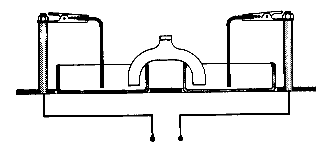
Chemical Concepts Demonstrated: Voltaic/galvanic cells, relative half-cell potentials
Demonstration:


Observations:
In the second set up, both the magnitude and the sign of the potential change. The potential is now roughly - 0.34 V.
Picture 2 shows the third set up. The potential is now - 1.10 V. If the leads are changed, the cell potential becomes + 1.10 V and the cell becomes a galvanic or voltaic cell.
Explanations (including important chemical equations):
With the leads connected so as to produce a cell potential of + 0.76 V, the half reactions are:
| anode: | Zn (s) ---> Zn 2+ (aq) + 2 e- | Eo = 0.76 V |
| cathode: | 2 H + (aq) + 2 e - ---> H2 (g) | Eo = 0.00 V |
| Zn (s) + 2 H + (aq) ---> Zn 2+ (aq) + H2 (g) | Eo cell = 0.76 V |
If the standard-state potential for the H+/H2 half-cell is assumed to be 0.00 V, and the potential for the anode half-reaction is equal in magnitude but opposite in sign to the standard-state potential for the Zn2+/Zn couple, then the standard-state reduction potential for the Zn2+/Zn half-cell must be - 0.76 V.
If the Zn2+/Zn half-cell is replaced with a Cu2+/Cu half-cell without reversing the leads to the voltmeter, the overall cell potential is - 0.34 V and the standard-state reduction potential for the Cu2+/Cu couple is therefore + 0.34 V.
| anode: | Cu (s) ---> Cu 2+ (aq) + 2 e- | Eo = - 0.34 V |
| cathode: | 2 H + (aq) + 2 e - ---> H2 (g) | Eo = - 0.00 V |
| Cu (s) + 2 H + (aq) ---> Cu 2+ (aq) + H2 (g) | Eo cell = -0.34 V |
If the H+/H2 half-cell is replaced with a Zn2+/Zn half-cell, the overall cell potential should be - 1.10V.
| anode: | Cu (s) ---> Cu 2+ (aq) + 2 e- | Eo = - 0.34 V |
| cathode: | Zn 2+ (aq) + 2 e- ---> Zn (s) | Eo = - 0.76 V |
| Cu (s) + Zn 2+ (aq) ---> Cu 2+ (aq) + Zn (s) | Eo cell = -1.10 V |
To set up a voltaic cell using these half reactions, one would have to reverse the leads to the voltmeter.